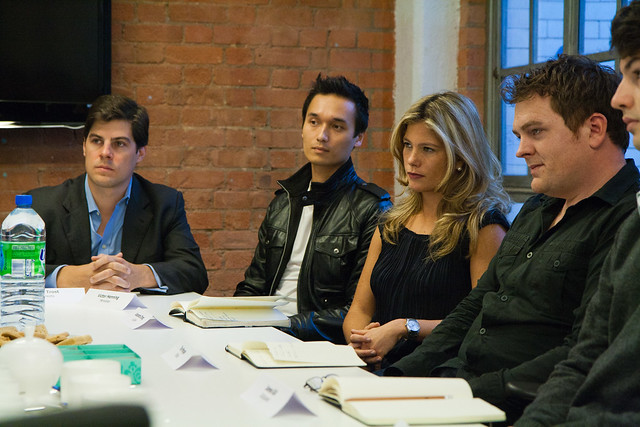-
What’s Saving Europe’s Startups?
Originally published as a guest post on TechCrunch Europe.
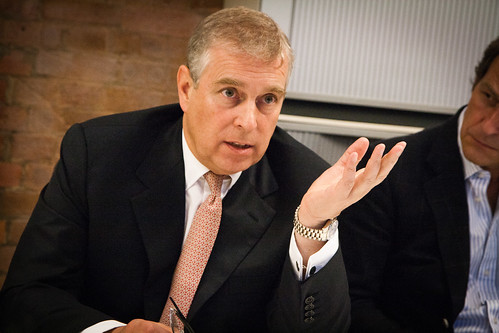 I’ve been in London for only a short period but I’ve already met with dozens of people from the various corners of the local start-up scene. It’s clear the ingredients necessary to build a thriving startup community are in place. Sparks are flying as companies form, events take place every night, and the promise of what’s been dubbed ‘Tech City’ and the more original ‘Silicon Roundabout’ takes shape. Still, it’s clear few major European success stories have emerged in the past few years to compare with Skype’s $2.6 billion exit to Ebay in 2005, leaving many people asking if European startups need something more to fan the flames.
I’ve been in London for only a short period but I’ve already met with dozens of people from the various corners of the local start-up scene. It’s clear the ingredients necessary to build a thriving startup community are in place. Sparks are flying as companies form, events take place every night, and the promise of what’s been dubbed ‘Tech City’ and the more original ‘Silicon Roundabout’ takes shape. Still, it’s clear few major European success stories have emerged in the past few years to compare with Skype’s $2.6 billion exit to Ebay in 2005, leaving many people asking if European startups need something more to fan the flames.Perhaps hoping to do just that Prince Andrew, Duke of York, visited Clerkenwell’s White Bear Yardthis week to lead a roundtable discussion with several startup CEOs. Prince Andrew’s visit was part of a wider planned tour of East London, and the Prince was accompanied by Eric van der Kliej of United Kingdom Trade & Investment (UKTI), CEO of the ‘Tech City Investment Organisation’. The discussion primarily covered the challenges and needs of local startups, and founders were repeatedly asked, “What do you need? What is the fuel that will help take this self-sustaining community to the next level? How do we help you grow?â€
As YCombinator founder Paul Graham wrote in his recent essay Why Startups Hubs Work:
“The problem is not that most towns kill startups. It’s that death is the default for startups, and most towns don’t save them. Instead of thinking of most places as being sprayed with startupicide, it’s more accurate to think of startups as all being poisoned, and a few places being sprayed with the antidote. Startups in other places are just doing what startups naturally do: fail. The real question is, what’s saving startups in places like Silicon Valley?â€
Graham’s essay identifies two fundamental requirements for successful startup hubs: a environment where being in a startup is the cool thing to do, and increased odds that startups will have a chance meeting with someone who can help them.
Fostering a Culture of Success
In the past 6 months, there has been an explosion of highly visible startup activity as exciting new companies launch, new coworking spaces open, new VC funds are raised, UK Trade & Investment champions Tech City, and companies raise some mammoth rounds of funding. It seems everywhere you turn there is a startup event taking place.
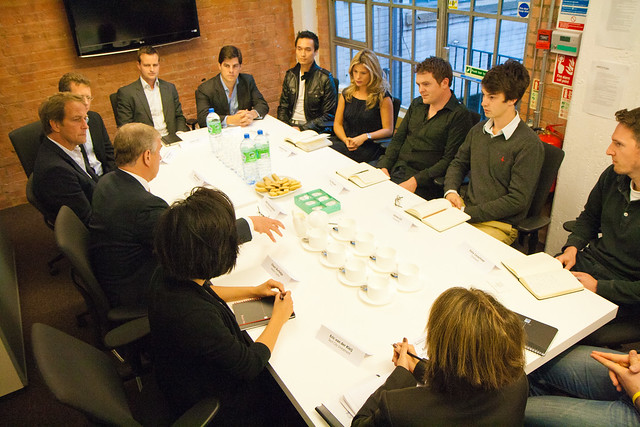 Clockwise from left: Eileen Burbidge (Passion Capital), HRH Prince Andrew Duke of York, Stefan Glaenzer (Passion Capital), Robert Dighero (Passion Capital), Alistair Hill (OnDevice Research), Jason Trost (Smarkets), Victor Henning (Mendeley), Alexandra Chong (Luluvise), Tim Morgan (Picklive), James Gill (GoSquared)
Clockwise from left: Eileen Burbidge (Passion Capital), HRH Prince Andrew Duke of York, Stefan Glaenzer (Passion Capital), Robert Dighero (Passion Capital), Alistair Hill (OnDevice Research), Jason Trost (Smarkets), Victor Henning (Mendeley), Alexandra Chong (Luluvise), Tim Morgan (Picklive), James Gill (GoSquared)A few have been quick to point out to me that they don’t see how the royal family could possibly help tech entrepreneurs. However, could it be that Prince Andrew’s visit yesterday provides precisely the kind of high profile activity needed to take startups mainstream in London? Some might call this “success theaterâ€, something Silicon Valley is expert at manufacturing, but might we also consider it good marketing?
Bringing greater attention to what’s happening here in London sheds light on many stories yet to be told, both positive and negative, about a community that has been built organically by extremely dedicated community leaders determined to make this a desirable hub for startups and innovation.
“If there’s one thing I’ve learned, it’s that startups certainly aren’t one size fits all,†Prince Andrew said, after asking each entrepreneur what would increase their startup’s chances of success. Among the responses: more emphasis on computer science in schools, more readily available investment dollars for early stage companies, tax benefits for those struggling to build new ventures, and more attention paid by the media to what startups are doing.
Instead of being regarded as strange for choosing the startup path, one participant remarked that is would be great to spread the message that working on startups is worthwhile and cool. “You are cool!†said Prince Andrew, “You are forward thinking, making something of life as it is today.†This sentiment of making the most of life as it is today resonates strongly with a speech Prime Minister David Cameron made early last week, calling on Britain to adopt and attitude of “can-do optimism†in the face of economic downturn.
You’re Winning, Now Tell the World
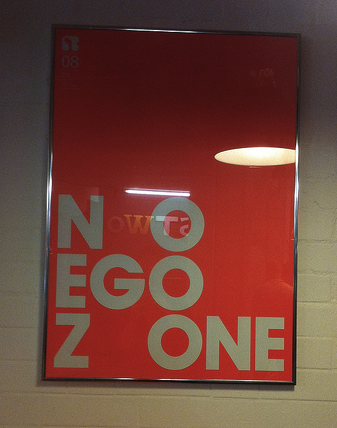 I’ve been asked to compare Silicon Valley to Silicon Roundabout more times than I can count over the past week. One thing that motivates me is reading about friend’s companies in the news. Silicon Valley tech press keep up a steady drumbeat of storytelling covering hundreds of startups and larger technology companies, fueled by a combination of PR, investigative journalism, and good old fashioned tips.
I’ve been asked to compare Silicon Valley to Silicon Roundabout more times than I can count over the past week. One thing that motivates me is reading about friend’s companies in the news. Silicon Valley tech press keep up a steady drumbeat of storytelling covering hundreds of startups and larger technology companies, fueled by a combination of PR, investigative journalism, and good old fashioned tips.People seem quick to refer to the echo chamber we enjoy in the Bay Area as something uniquely American, telling me that its not very British to brag about accomplishments and that it simply won’t work here. Isn’t this just a lot of noise, my new friends ask. Isn’t it true that many of these companies are fluffy, flighty, and ultimately fail? Well yes, but we’re okay with that.
While the startup press may be a bit of an echo chamber, it is encouraging to read stories of other people like ourselves finding success. Even stories of grappling with challenges or facing failure are inspiring for the readers, and often cathartic for the company involved. If there is one thing can may be presumptuous enough to suggest London startups can learn from Silicon Valley companies, it is how to make sure the world knows when they’re winning, and to realize that they are telling these stories on behalf of the entire community. Whether its tipping off the tech press (tips@techcrunch.com) or self-publishing, companies who work to get their stories heard are the ones who get covered, and have the opportunity to provide inspiration.
“The London tech scene needs heroes,†explained Tim Morgan, CEO of Picklive, a social gaming startup for sports fans. “When was the last time you heard of someone who made millions on options? We need people we can look up to.â€
Creating an echo chamber in the press isn’t just noise for its own sake. Startups who are written about in notable press outlets help project a more legitimate image for their businesses that helps close sales, land partnerships, and hire great employees. Not only does this help individual startups, it elevates the awareness and respectability of the startup community as a whole. This market is far from a zero sum game, one startup winning more doesn’t mean others are winning less… instead the story told to the broader mainstream audience ought to be that overall startups are winning, and more people should join in.
Make Your Own Luck
The second part of the criteria for startup hubs that work is increasing the odds that you’ll run into people that can help you. Please don’t be the hundredth person to tell me that this isn’t California and that it just doesn’t happen here. There are people all around you, every moment, who can help you. I’ve met them, they’re real and amazing warm, welcoming, and incredibly generous with their time.
Graham’s essay continues:
“Chance meetings produce miracles to compensate for the disasters that characteristically befall startups. In the Valley, terrible things happen to startups all the time, just like they do to startups everywhere. The reason startups are more likely to make it here is that great things happen to them too.â€
The luck startups need can be manufactured (or at least nurtured), just like the culture of success. If what we discussed before was “success theater†this second criteria requires startups to force density to increase the chances of running into someone who can help, by surrounding themselves with people who are pre-disposed to help startups. Companies are trading their home offices for coworking spaces where they can network with other teams, founders are trading their Wednesday at the pub for a technical meetup where they can recruit developers, and Tech City is working to foster a great density of startups and entrepreneurs in East London.
The potentially uncomfortable corollary is that startups need to stop spending time with people who don’t believe that their dreams can ever be real, and replace them with people who are cheering for them and want their success as much as they do.
There are incredible opportunities for startups in London, but it is up to founders and startup employees to leverage these resources to derive every possible benefit for their companies. For those of us serving and observing the market and figuring out how to enter it, we can help spread the stories and faciliate the introductions that make success and luck possible for everyone.
Prince Andrew Visits the StylistPick Offices
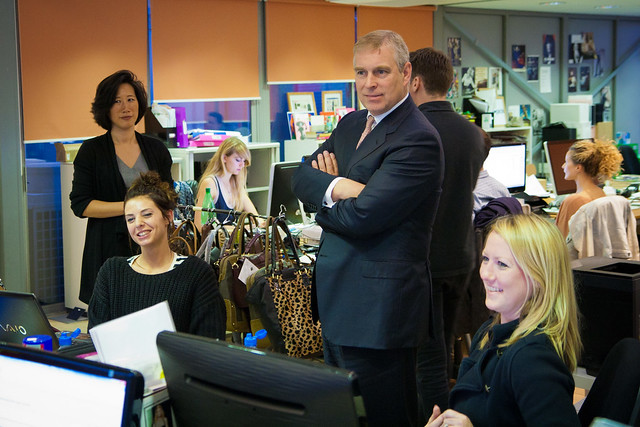
White Bear Yard Startup CEOs
